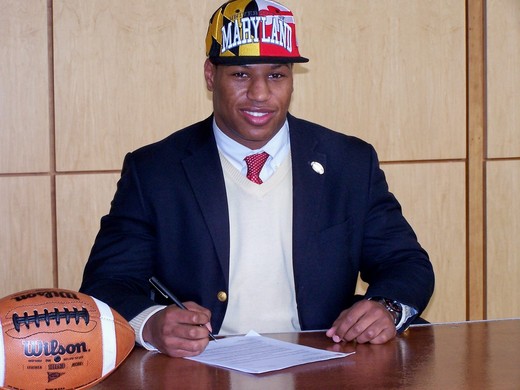
Yesterday college football fans were treated to what has become a national holiday, Signing Day. February 1st marked the first day that a high school senior football student-athlete could sign a National Letter of Intent (NLI) to play collegiate football at an NCAA member institution. The NLI program, which is managed by the NCAA Eligibility Center and governed by the Collegiate Commissioners Association, does not just include football but includes all NCAA sponsored scholarship sports. NLI membership includes 620 NCAA Division I and II member institutions. Ivy League, service academies, NCAA Division III, NAIA, prepatory and junior colleges are not part of the NLI program. The impact of signing an NLI is the prospective student-athlete agrees to attend the designated college or university for one academic year and the selected institution agrees to provide athletics financial aid to the student-athlete, provided he/she is admitted to the institution and is eligible for financial aid under NCAA rules.
While the purported goal of the NLI program was to benefit both member institutions and prospective student-athletes, there are many considerations prospective student-athletes need to take into account before signing a letter of intent with any NCAA member institution. These considerations include:
1. Voluntariness: While signing the NLI is voluntary, virtually all NLI member institutions strongly encourage prospective student-athletes to sign. Prospective student-athletes need to be aware of the obligations that come with signing an NLI and the ramifications that may come with not signing an NLI.
2. Penalties: The basic penalty for not fulfilling the NLI is to serve one year in residence (full-time) at the next NLI member institution and lose one season of competition in all sports (not just the sport the NLI was signed in).
3. Coaching Changes: A prospective student-athlete is signing an NLI with an institution. A coach leaving the institution in which the prospective student-athlete signed the NLI does not release the prospective student-athlete of the NLI's obligations. Further reading on coaching changes and both prospective and current student-athletes can be found here.
4. NLI Declared Null and Void: An NLI signed by the prospective student-athlete does not mean it will necessarily become binding on the institution. An NLI can be declared null and void for the following reasons: (1) the prospective student-athlete was denied admission to the institution; (2) the prospective student-athlete does not meet NCAA, institutional or conference eligibility requirements; (3) the prospective student-athlete does not enroll at the institution for one year after he or she signed the NLI and the scholarship is no longer available; (4) the prospective student-athlete serves in the military or on a church mission following the signing of the NLI; and (5) the sport in which the prospective student-athlete signed on to play at the institution is discontinued.
5. Early Signing Period Penalties (Football): Prospective student-athletes in the sport of football cannot sign during the early signing period. A prospective student-athlete who signs an NLI in another sport will be ineligible to play football at that institution during his first year of enrollment and shall forfeit one season of competition in the sport of football.
6. Recruitment Ceases: Participating conferences and institutions are obligated to respect a prospective student-athlete's signing by terminating recruitment after a prospective student-athlete signs an NLI.
7. Signing Day: While many prospective student-athletes choose to sign on what is referred to as "signing day," it is important to understand this usually just marks the first day a prospective student-athlete may sign. All sports that are part of the NLI program actually have signing periods which allow a window for a prospective student-athlete to sign. These signing periods can be found here.
For further information on the National Letter of Intent program, please refer to the
NCAA's website.


